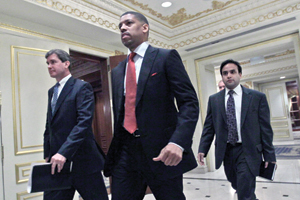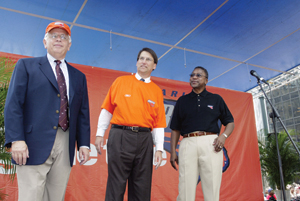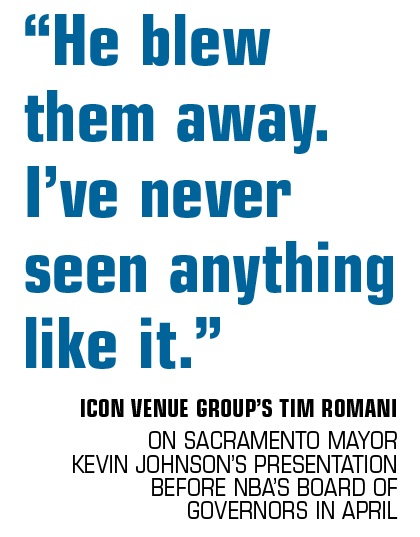Kevin Johnson needed advice. As a first-term mayor with a background as a professional basketball player, he was facing the issue that was likely to define his tenure. The Sacramento Kings, his city’s only big league sports team, had just announced their intention to leave the city for Anaheim. If he couldn’t save the team, Johnson wanted to lay the groundwork for the city to get another. But how?
Thousands of miles away, Pat McCrory had been through the process. He was in his fourth term as Charlotte’s chief executive in 2002 when the NBA’s Hornets left town for New Orleans, despite previously leading the league in attendance for seven consecutive seasons. McCrory couldn’t stop them, but in the years that followed he managed to get both a new franchise for Charlotte and a new arena for it to play in. He also, not incidentally, was re-elected three more times.
 |
AP IMAGES
Sacramento Mayor Kevin Johnson (right, with Icon Venue Group’s Tim Romani, left, and Johnson's chief of staff Kunal Merchant) went to the NBA as the Kings were about to leave for Anaheim. |
McCrory is a Republican and Johnson a Democrat. Their thoughts about government’s ideal role lie a long distance apart on the ideological spectrum. But the fraternity of mayors facing the task of trying to save a sports team without giving away the store is a tight one. When Johnson reached out in March, McCrory took the call.
“I told Kevin the good, bad and ugly about the process,” he said recently. “In these tough times, mayors have to be as tough as the business leaders, and that includes the NBA commissioner. They’re running a business and you’re running a business, one called City Hall. You have to make sure ego and politics doesn’t overrule a basic business decision.”
But at the same time, McCrory said, “whether people like it to not, sports teams do represent the culture of a city. And even when you disagree with what the NBA does, you need to keep the relationship for a chance at a team.” He reiterated that to Johnson: “Build that relationship. Go see them. That’s the most important thing you can do.”
■ ■ ■
McCrory is one of many former mayors who could commiserate with Johnson. For a mayor, interaction with a sports league and its often peripatetic franchises can lead to frustration and rancor, pain and bitterness. After all, there are always cities that want teams — and never enough teams to go around. It’s like a perpetual game of musical chairs, the chairs in this case being the newest arenas with the most favorable lease terms.
Yet few aspects of civic business resonate as deeply as the loss — or gain — of a sports team. Other companies can come and go, and make a substantial economic impact in the community in the process. But none of them wears the name of the city or the state on its shirts. “There’s an emotional attachment to a sports team, both good and bad,” McCrory said. “So people take the actions of those teams very personally. Sometimes to the detriment of both the city and the sports team, and sometimes to the benefit of both.”
Throughout the last half-century, sports franchises have hopscotched the continent, leaving cities and their disgruntled chief executives behind. “Every owner knows the threat to move is the biggest thing they have in their favor to get the deal they want, and that makes the discussion unequal,” said former New Orleans Mayor Marc Morial, whose father, Ernest, was running New Orleans when the NBA’s Jazz left for Utah in 1979. (Later, Marc Morial successfully lobbied the league to keep the Hornets in place after Hurricane Katrina.)
Some mayors make the decision, whether ideological or pragmatic, not to intervene. When the NBA’s SuperSonics were leaving Seattle, then-Mayor Greg Nickels did little more than round up potential buyers for the franchise should a new arena be approved, though he later sued the team’s owners in an effort to get a larger exit payment for the city. Similarly, Atlanta’s Kasim Reed pointed to the poor economic performance of the NHL’s Atlanta Thrashers as the reason that the city was powerless to prevent them from moving to Winnipeg last month. “The Thrashers are in an extraordinary position,” he said. “We have not seen a path … where we can reverse those losses.”
Cleveland’s Michael White famously was able to convince the NFL to let the city keep the Browns nickname for future use when the team left for Baltimore in 1995, but such a Pyrrhic victory, coupled with the vague promise of a future team, is about the best that a mayor can expect. Far more frequently, he or she is left with … nothing. “We were played by the NHL,” said Susan Thompson, who was mayor of Winnipeg when the NHL’s Jets left for Phoenix in 1996.
When the team that leaves is the only one in town, as in Winnipeg, the loss has that much more impact. “Having a team gives you a certain status level,” Thompson said. “An NHL team is a huge component of economic development. Beyond that, cities are human entities. Having a team builds pride and sense of community. And then there’s the international outreach. How many economic entities do you have in the city that give you that? I think the reach, recognition and status that a team brings to you is highly underestimated. That’s why it was such a blow.”
That her city has recently regained big league status with the relocation of the Thrashers only makes Thompson, who was in her second term as mayor when the Jets left and chose not to run again, that much more certain that she was right. “Anyone with an ounce of intelligence,” she said, “can see that this is a place that the league should have come back to. Or never left.”
 |
NBAE / GETTY IMAGES
Charlotte Mayor Pat McCrory (center) celebrated the Bobcats’ arrival with NBA Commissioner David Stern (left) and team owner Bob Johnson. |
Mayors who fight the process risk looking weak and ineffectual, while alienating voters who believe that sports franchises should be purely private enterprises. “The hard part is that when you’ve had one, people don’t want to lose it,” said former Minneapolis Mayor Sharon Sayles Belton, who fought to get an NHL franchise in Minnesota after the North Stars left in 1993, shortly before the start of her first term in 1994, and succeeded by helping to bring the Wild to the region at the end of her second. “They don’t necessarily want to pay for it, but at the same time, they don’t want to lose it. So that makes it tough.”
McCrory remembers the struggle to keep — or replace — the Hornets being one of the most difficult of his tenure. “The community here was very divided,” he said, and that’s never good for a mayor’s popularity. As McCrory describes it, roughly half of Charlotte wanted to save the team at all costs. The other half wanted to run team owner George Shinn out of town, and the NBA with it. Five years before, when the Hornets were still riding high, Shinn had been accused of sexual assault by a former employee. “He had disrespected many of the people in the community by his behavior and specific actions, and that was a slap in the face to the emotional investment that many of our citizens had put into the team,” he said. Yet NBA basketball clearly had a latent base of support in the city. And what mayor wants to lose a team on his watch?
Not McCrory, who pushed through a new arena plan despite losing a voter referendum on the topic. And not Johnson, a political newcomer with the potential for a long career holding elective office ahead of him. “I told Kevin that he’s going to catch a lot of heat from his critics, people who say, ‘The heck with the NBA,” said McCrory, a former college basketball referee. “It wasn’t a slam dunk that he go to New York and fight for this. It was a tough call, both financially and politically. It’s a block/charge call, almost 50-50. Either way, you’re going to irritate someone. But as I learned in refereeing, you’ve got to sell your call. You have to make the case for the long-term investment. That’s what I had to do, and I still catch heat for it.”
Johnson took the advice and went to New York in April, where he presented to league owners. He brought with him $7 million in new business commitments, produced a potential buyer if the Maloofs were willing to sell, and reminded the NBA’s owners that Sacramento is a top-20 television market, one of only two in the country with just a single big league team. (Orlando is the other.) “For an elected official to take such a leadership role and, in essence, put his political future on the line was very, very impressive,” said Clay Bennett, the chairman of the NBA’s relocation committee.
 |
He also infused his presentation with an infectious passion, seeming to channel the groundswell of public support for the Kings that had enveloped Sacramento in recent weeks. “He blew them away,” said Tim Romani of Icon Venue Group, who was in the room on Johnson’s behalf presenting a potential arena plan for Sacramento. “I’ve never seen anything like it.” Within a day, the league had agreed to send a task force to Sacramento to examine the seriousness of the new corporate commitments. And by the end of the month, the team had agreed to stay at least another season.
But that was only half the battle. In the midst of an NBA lockout, Johnson still needs to make the case for a substantial taxpayer contribution to a new arena, and do it in the worst fiscal climate in California since the Great Depression. “Ten years ago, a mayor could say ‘I’ll raise my hotel/motel tax.’ ‘I’ll raise my rental car tax.’ ‘I’ll go to the voters,’” Morial said. “You can’t do that now. The money just isn’t there. But if you want a team, you’ve got to bite the bullet and somehow finance a facility. And then all your critics will show up at the ribbon cutting. They’ll all show up and smile.”
That’s easy enough for Morial to say from the comfort of his political retirement. But for a nascent political figure such as Johnson, asking for money for a sports facility is perilous ground. “You can’t have a conversation about subsidizing or underwriting a portion of the cost of an arena without a series of long and difficult conversations with all of the stakeholders involved,” said Sayles Belton. “And when you do that, emotions are likely to run high.”
In this discussion, too, Johnson’s NBA career is more of a liability than an asset. He needs to prove to the city that he isn’t putting his own feelings for the sport ahead of Sacramento’s interests. “If you’re out there saying ‘I want to keep my team,’ that doesn’t work,” he said. “I have to build a case in Sacramento that it’s bigger than basketball.”
The case he is building is mostly about business. If the Kings left, a study commissioned by the city shows they would take 1,000 jobs — direct and ancillary — with them. They would no longer pay the property taxes they had been paying, civic income that is deposited into Sacramento’s general fund. And he reminds constituents that the NCAA already has decided not to book future events in Power Balance Pavilion, the former Arco Arena, which it considers outdated. That move alone, one study has indicated, is costing the city as much as $5 million in annual revenue.
But Johnson also has tapped into the idea that a big league team helps define a city. Former Charlotte Mayor Richard Vinroot, who played college basketball at North Carolina, had made the same case around his city when attempting to secure an NFL expansion franchise, the team that ultimately came to life as the Carolina Panthers. “I don’t think you can overestimate the value,” Vinroot said. “You’ll never get most citizens to understand why you’re doing it, why it’s worth the effort, but in the end, it is worth the effort. Look at Oklahoma City. What went on there this year during the playoffs night after night, what’s going on now in the minds of the people as they think of their city and their future — it’s not the same as it was before. The city has changed because of the team. That’s what makes them worth fighting for.”
■ ■ ■
Yet for every Oklahoma City that gains a franchise, there’s a Seattle that loses one. And for every Sacramento, there’s an Anaheim, which — for the moment, at least — has done nothing more than put the Kings in position to get a better deal where they already are.
 |
| Johnson advised mayors to watch recent documentaries about the Colts’ departure from Baltimore and Seattle’s loss of the Sonics to underscore the message that no city is safe. “They terrified me,” Johnson said. |
In that sense, talk of franchise relocation can’t help but pit cities and their chief executives against each other. “I remember in the competition for NFL expansion.” said Vinroot. “St. Louis andBaltimore had both lost teams, and they were vying with Charlotte and — nobody knew it at the time — Jacksonville. And I kind of felt sorry for both of those cities. They’d had pro teams that had run away, which must have been devastating. I felt a fair amount of sympathy for them that we were going to come in and mess up their party. And as it turns out, we did.”
In the mid-1990s, Morial co-chaired a task force on that topic under the auspices of the U.S. Conference of Mayors. “We said, ‘Look, we’re being asked to go out on a limb and build new facilities,’” Morial said. “We need to ensure that there are objective rules so some owner who might get a better deal in another city can’t just go move there with no strings attached.”
The task force made tangible gains, including convincing the NFL to revise its rules governing franchise relocation. But it didn’t — couldn’t — solve the problem. This year, Indianapolis Mayor Greg Ballard convened a meeting to try to establish a nonprofit organization that would have a database of lease agreements around the country, and a staff to help mayors faced with the impending loss of a team figure out where to turn. Johnson spoke to the group in June, advising mayors to watch recent documentaries about the Colts’ departure from Baltimore and Seattle’s loss of the Sonics to underscore the message that no city is safe. “They terrified me,” Johnson said.
Ballard’s group is going forward. But mayors still need to pursue their constituents’ interests. It’s important to remember that, after chairing the task force on mitigating franchise relocation, Morial spent his eight years in office zealously pursuing an NBA team to replace the Jazz. As it turned out, his was a zero-sum solution. On the day in May 2002 that Pat McCrory was coming to grips with the Hornets’ departure from Charlotte, Morial and his staff were jubilantly celebrating their arrival in New Orleans.
Bruce Schoenfeld is a writer in Colorado and can be reached at bruce@bruceschoenfeld.com.









